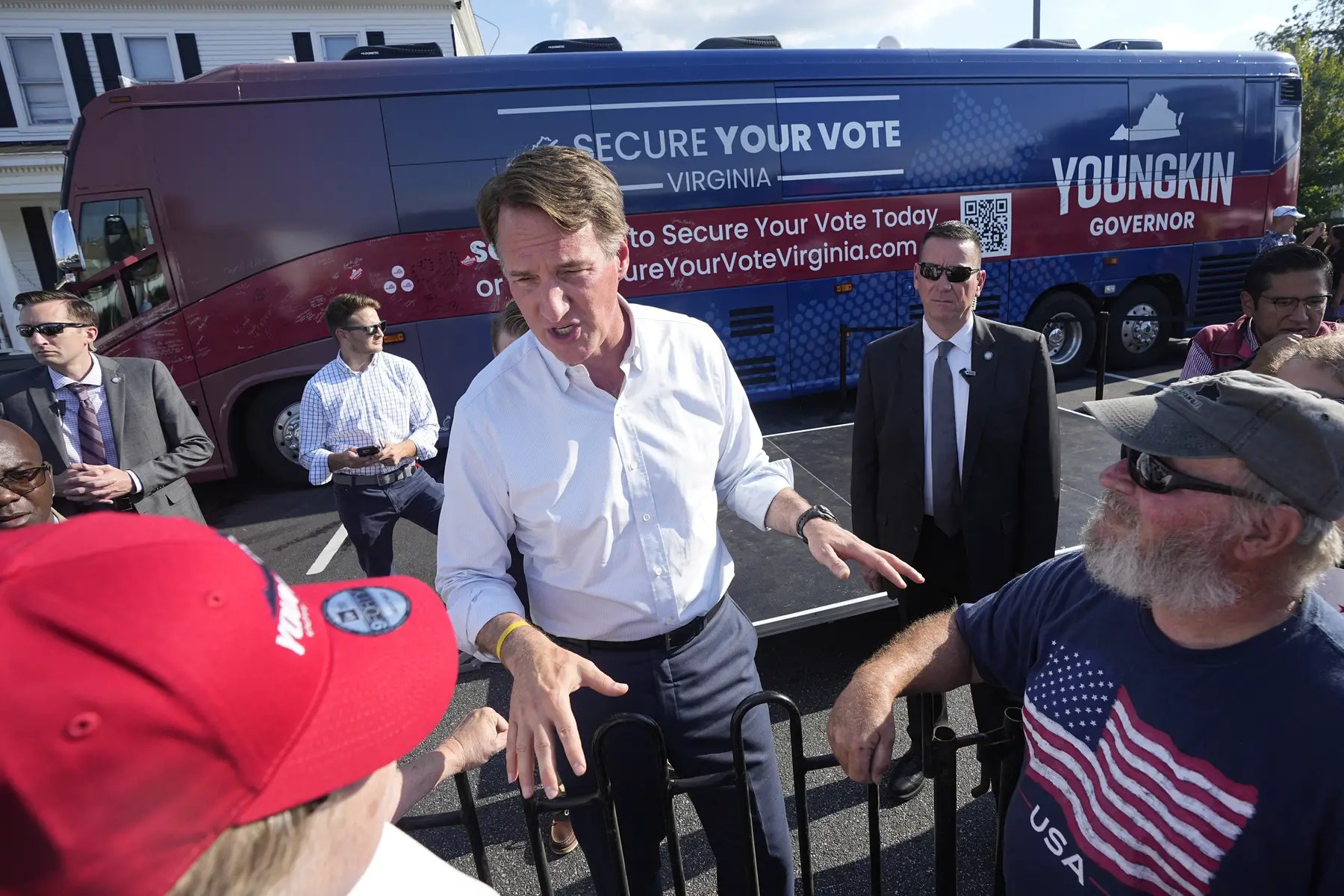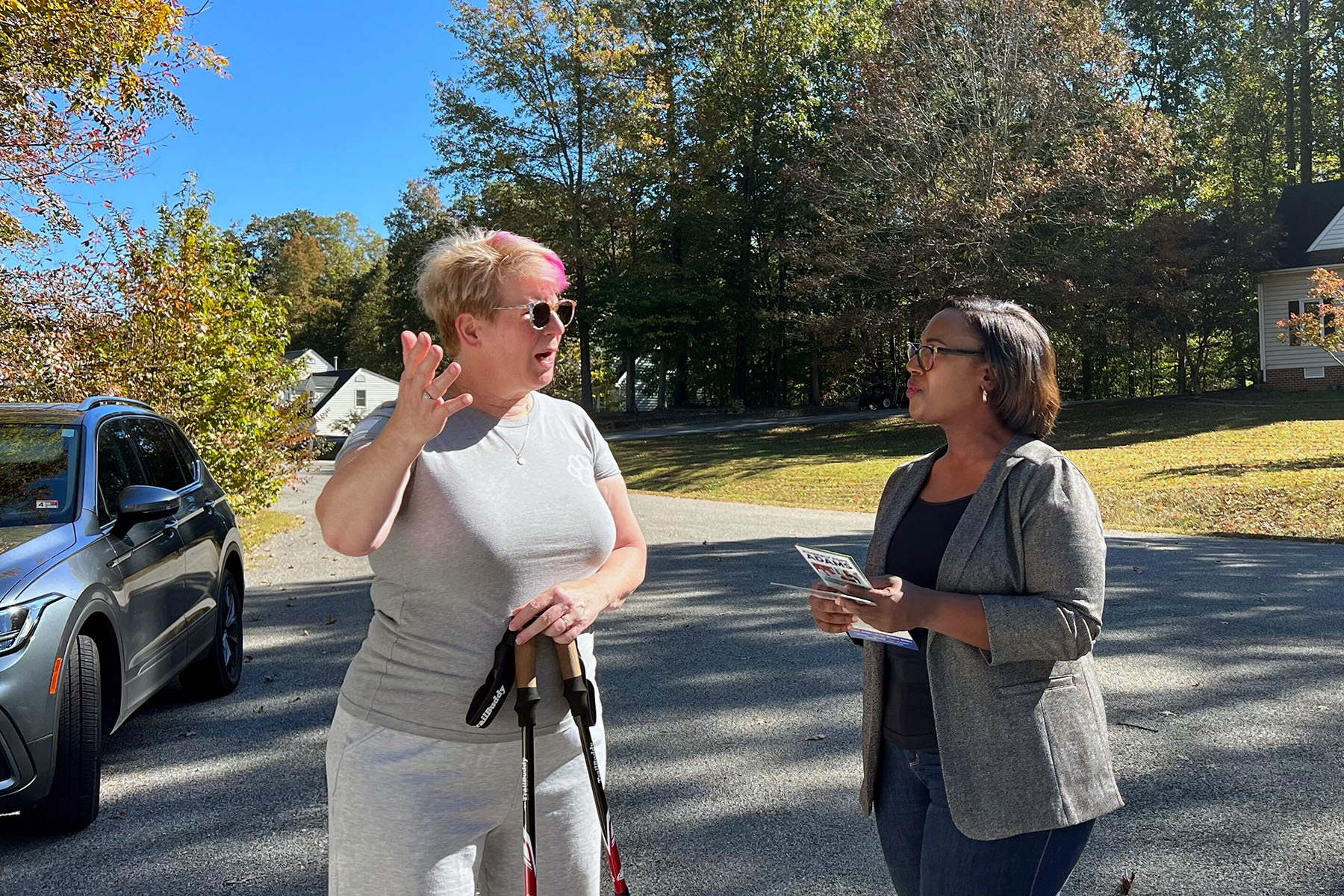Virginia voters handed Democrats control of the Senate. See the results here, and sign up for our daily newsletter.
PRINCE GEORGE, Virginia — Door-knocking in this rural neighborhood 30 miles south of Richmond, state House candidate Kim Pope Adams encounters a voter who wastes no time getting to the point.
“I’m not voting for you. I can’t — you’re a little too liberal for me actually,” the voter, U.J. Severin, 61, said, listing out concerns about public safety and stewardship of public dollars. But, Severin said, she also isn’t voting for Adams’ opponent, Republican Kim Taylor, “because of her abortion stance.”
Adams spends the next 25 minutes going back and forth over the positions on her flier, bullet by bullet. Severin is unequivocal in her support for abortion rights — “that issue is very close to my heart” — but it hasn’t been enough to drive her to the polls in favor of Democrats. Standing under a blazing sun on this warm fall morning, Adams is working to change that.
Heading into 2024, voters in this state will send a powerful message to the nation about the potency of abortion as a political issue — testing Democrats’ strategy to center abortion and the prospect of tightened restrictions as their primary motivator in an election where abortion isn’t directly on the ballot. It’s also a test of whether voters support — or at least aren’t motivated against — a ban on abortions after 15 weeks of pregnancy, which Republican candidates in Virginia led by Gov. Glenn Youngkin have openly embraced as “common sense” policy.
If Republicans flip control of the state Senate and hold control of the state House in the November 7 election, Youngkin will have a clear path to further restrict abortion in the South. Control of each chamber will come down to just a handful of districts, including Adams’, which flipped red in 2021 by just over 500 votes.
“The reaction I’ve heard on doors is that there is no compromise when it comes to a woman’s right to make your own reproductive health care decisions,” said Adams in an interview. Her opponent, Taylor, has declined to say whether she supports Youngkin’s plan, but she celebrated the overturning of Roe v. Wade and voted in favor of a fetal personhood bill in the legislature last year.
The prospect of abortion restrictions after the fall of Roe v. Wade in June 2022 helped drive Democratic victories that year, and Democrats in Virginia expect the issue to continue to motivate voters in a state where 73 percent of all voters and 70 percent of independent voters believe abortion laws should stay as they are or become less strict. Abortion in Virginia is unrestricted through 26 weeks of pregnancy and legal to protect patient health with physician certification thereafter.
Virginia Republicans, meanwhile, have countered Democrats’ strategy by betting on Virginians to prioritize other issues at the ballot box and by trying to neutralize worry over more severe restrictions by embracing a 15-week ban with exceptions for cases of rape, incest and to protect the life of the pregnant patient. Polling shows Virignians are evenly split on this proposal — 46 percent in favor, 47 opposed.
Virginia Republicans say such a policy would not be a “ban,” but rather a “limit.”
“Here’s the truth — there is no ban. Virginia Republicans support a reasonable 15-week limit,” says a woman’s voice in a political ad paid for by Youngkin’s political arm that’s airing in the state’s largest urban and suburban areas through Election Day. The 30-second spot features the sound of a baby cooing, an ultrasound heartbeat and the sound of a heart monitor flatlining.
Republicans’ coordinated campaign believes voters need to hear directly from the party on the issue and that rallying candidates around a 15-week ban will counter Democrats’ warnings, like that of a total abortion ban with no exceptions, said Matt Moran, a longtime GOP strategist and the executive director of Youngkin’s PAC. He said the campaign spent months training candidates on messaging around the issue and sharing data with them about how different approaches resonate with voters. (The PAC said it held focus groups with over 30 women who are swing voters to study their reactions to a 15-week ban.)

This strategy stands in contrast with Republicans’ approach to the issue in the 2022 cycle, when many GOP candidates in competitive races avoided staking out clear positions on abortion or talking about the issue altogether.
Democrats say Virginia voters won’t be swayed by Republicans calling their proposal a limit instead of a ban, while pushing for further restrictions. Democrats are also arguing that with a Republican legislative majority, nothing would keep Youngkin from going further than 15 weeks.
“There are extreme candidates that he’s endorsed that want an even more extreme ban. Youngkin will show his true colors if he gets a trifecta,” said Heather Williams, the interim president of the Democratic Legislative Campaign Committee.
Virginia Republicans’ embrace of abortion restrictions only goes so far: Youngkin and many candidates in competitive races have stopped short of actively campaigning on the issue. At a Wednesday rally in Fredericksburg, Youngkin did not mention abortion, and Republican Senate candidate Tara Durant would not answer a reporter’s question about her position on the issue after the event. None of the flyers spread out on a table featuring local Republican candidates included a mention of the issue.
Asked about her views during a recent debate, Durant said she supported Youngkin’s plan.
Democrat Joshua Cole, whose competitive House district overlaps with Durant’s, said embrace of any abortion restrictions will cost Republicans voters in this area. Cole said he has been seeking out persuasion conversations while door-knocking, and has found a common stance among swing voters.
“Most people are like in the middle: They don’t want this 15-week abortion ban, but the Republican messaging of late-term abortions — people think that it’s going on in Virginia,” Cole said. Medical providers generally do not use “late-term abortion” to refer to abortions at the end of pregnancy, which are exceedingly rare. In Virginia, abortions after 26 weeks are legal only if three physicians certify that the procedure is needed to avoid death, or substantial and irremediable harm to the pregnant patient’s mental or physical health.
Cole added he’s had conversations with Republican women who identify as “pro-life” but don’t want to go back to the state of abortion access before Roe v. Wade. Cole, an assistant pastor at a local congregation, also described a conversation with a fellow Black pastor about abortion. The man said he “didn’t care for abortion,” but was swayed to support Democrats by a conversation with his daughter. “He said, ‘My daughter sat me down last week and said to me, “I have less rights than mom did a couple years ago.’”
Cole said voters in his district are worried about education, the economy and even transportation, given the gnarly traffic that regularly clogs up the stretch of the I-95 corridor through his district. Cole, who is bisexual, is also running to protect LGBTQ+ rights.
Asked if abortion would be a key motivator in the race, Cole said: “I don’t know if I can really say that it’s the major motivating factor, but as we’re knocking doors, this is what people are talking about,” Cole said. “So when the Republicans are saying that everyone’s not worried about this issue, that’s absolutely not true.”
At Youngkin’s “Secure Your Vote” rally in Fredericksburg, two women who planned to support Republican candidates but had not voted yet said they were satisfied with Republicans’ support of a 15-week ban.
One of the women, Joanie, 46, who declined to give her last name, said she was glad state Republicans are rallying behind a 15-week abortion ban. “I like that they are bringing people together and doing something in the middle,” she said, adding that she has a teenage daughter with whom she has open conversations about the issue. “It’s not necessarily what each individual [candidate] supports, it’s what their position is when they get to Richmond.”
Kimberly, 36, said she is planning to support the Republican candidate in her district based on concerns over the rising cost of living. Asked about abortion, she said it’s “a complicated issue,” and that while she supports some restrictions on ending a pregnancy, “if you force it upon, what kind of life would that be?”
Polling data suggests Virginia’s legislative elections will come down to the wire. In the Virginia Senate, where Democrats have a three-seat edge, control of the chamber will come down to four competitive seats, according to an analysis from the Virginia Public Access Project. Control of the Virginia House, where Republicans won a four-seat majority two years ago, will come down to seven competitive races, VPAP reports.
In 2021, Republicans led by Youngkin successfully increased GOP turnout by pushing for early voting, countering false messaging from former President Donald Trump and the GOP tying early voting to election fraud. Youngkin’s political arm has spent millions this cycle to expand on that strategy, and data suggests the GOP’s early voting numbers so far have outpaced 2021 levels, according to separate analyzes from Politico and political data firm TargetSmart.
Asked whether they favor a generic Democrat or Republican in the race for the Virginia House, 47 percent favored Democrats and 43 percent Republicans, a Washington Post/Schar School poll conducted in mid-October found. Among independent voters, there was no statistically significant edge for either party.
Out in Prince George, Adams and Severin jump from issue to issue. Adams says she, too, cares about public safety in her rural county, where there’s just a sheriff. She’s a single mom to a son in public school, and is deeply invested in public education. Both women are trained accountants.
“I believe that you are closer to voting for me now,” Adams says.
“You’re right, you’re right,” Severin says, shaking Adams’ hand. “You took 30 minutes to get one vote.”









